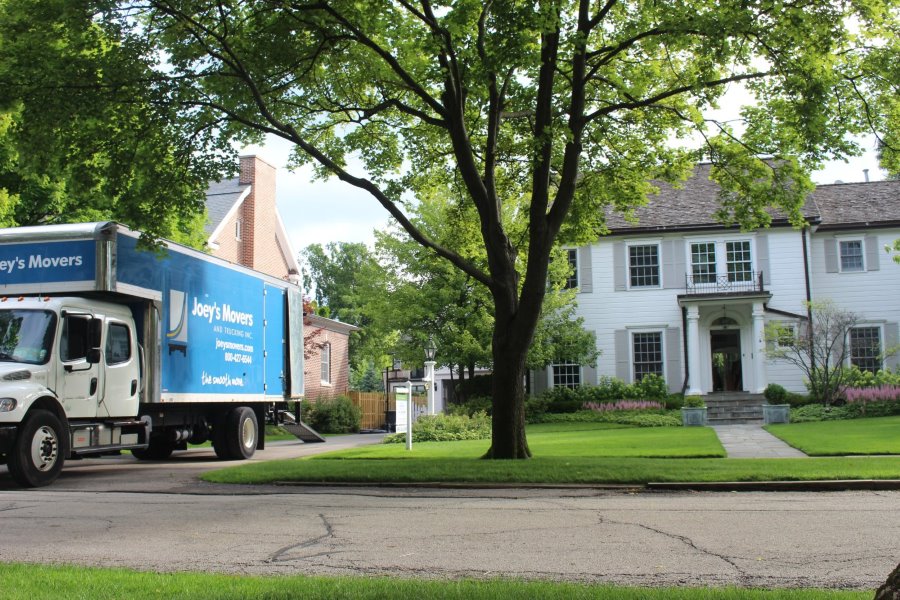Every year, thousands of Chicago residents and businesses relocate—across neighborhoods, to the suburbs, or out of state. With the sheer number of moving companies available, it’s easy to assume they all operate under the same rules. But understanding the difference between licensed vs bonded movers is key to protecting your belongings and avoiding common pitfalls.
This guide will:
- Explain the difference between licensed and bonded movers
- Explain what insurance adds to the equation
- Provide you with clear and actionable steps to protect your move and your belongings.
Unlike generic moving guides, this article also incorporates insights from real moving company experiences, including seasonal pricing trends, consumer risks, and verification strategies. Our goal is to help you select qualified, reputable movers in the Chicagoland area.
What Does It Mean to Be Licensed, Bonded, and Insured?
Before hiring a mover, it’s important to understand the legal and financial differences between licensed vs bonded movers, and why these terms matter for both safety and accountability. When evaluating moving companies, the termslicensed,bonded, andinsured often appear together, but they each refer to distinct legal protections. Understanding what they mean can help you avoid scams, ensure accountability, and protect your belongings from loss or damage during a move.
The bonded vs licensed movers debate often confuses consumers, but each offers different levels of accountability and legal obligation.
Licensed Movers in Chicago
A licensed mover is registered with relevant state or federal authorities, and they must comply with industry regulations. These credentials ensure that the company is accountable to specific legal and safety standards.
- Moving companies must be licensed by the state for intrastate moves within Illinois. If you are unsure if a company is licensed in Illinois, you can check on the Illinois Commerce Commission website. Here is ours!
- For interstate moves, movers should be registered with the U.S. Department of Transportation (USDOT) and the Federal Motor Carrier Safety Administration (FMCSA).
Licensing confirms that a company has passed minimum workplace qualifications, such as maintaining a legal business entity, following labor laws, and submitting proof of insurance and bonding (if required). It also allows for oversight and consumer protection through state and federal complaint resolution processes.
Bonded Movers in Chicago
When a mover is bonded, it means the company has secured a surety bond through a third-party provider.
If a customer suffers a loss due to incomplete or negligent service, they can file a claim against the bond. If the claim is approved, the surety company pays the customer up to the bond’s limit. Then, the mover is responsible for reimbursing the bond provider.
While bonding can offer some peace of mind, it has distinct limitations.
- Many bonded-only movers operate without proper licensing or insurance.
- The bond amount may not cover the full cost of your loss.
- Bonds are designed for contractual breaches rather than for physical damages, theft, or injuries. It should not be considered as a substitute for insurance coverage.
Before trusting a bonded mover, ask for proof of the bond, the provider’s name, and instructions for how to file a claim if needed.
Insured Movers in Chicago
Professional moving companies carry insurance to cover any issues that could arise. These include but are not limited to:
- Cargo Insurance. Covers items in transit from loss, theft, or damage.
- General Liability Insurance. Covers property damage and injuries that occur during the move.
- Auto and Truck Insurance to cover vehicular accidents on your property and the road.
The benefits of insured movers include reduced financial risk, peace of mind, and reliable claims processing if anything goes wrong.
The FMCSA also requires a long-distance carrier to maintain bodily injury and property damage based liability insurances of at least $750,000 coverage. If they are licensed, you can confirm their mandatory coverage through the FMCSA website. Otherwise, you can request proof of insurance and confirm with the insurance company.
Don’t take chances with your move—choose a fully licensed, bonded & insured company you can trust. Call (847) 674-7779 or request a free quote today.
Risks of Hiring Bonded-Only or Unlicensed Movers
The unlicensed moving company risks range from property damage to legal liability if someone is injured during the move. While bonded-only or unlicensed movers may offer lower upfront pricing, the long-term costs from property damage, lost items, or legal disputes can be substantial. Here are some of the most common problems customers face and why verifying mover credentials is essential for a safe, stress-free move.
Untrained Labor and Unsafe Practices
One of the most overlooked issues is the dangers of untrained movers, which can lead to damaged items, safety hazards, and liability exposure. Unlicensed companies often cut costs to offer lower rates. One of these cuts usually involves using day-shift workers and untrained labor to perform moves. According to industry data, damage and loss claims are 2.5 times more likely when a move is handled by untrained or temporary laborers. This significantly increases the chance that items like glassware, electronics, artwork, or heirlooms may be damaged beyond repair.
These workers are rarely covered by workers’ compensation or company liability insurance. If someone gets hurt on your property, you could be held responsible for medical costs or legal claims.
In contrast, licensed and insured movers employ trained professionals who understand how to protect your belongings and your home. Joey’s Mover’s experts have been with our team for years and are like part of the family—and they aim to be like part of yours during the move. They are trained in everything from the best packing practices to handling fine art during a move.
Limited Recourse for Damage or Theft
Perhaps the most serious risk of hiring an unlicensed or bonded-only mover is the lack of accountability when something goes wrong. These companies are not actively monitored by the same groups as licensed professionals.
- Compensation is limited or nonexistent. If something goes wrong, there is no easy way to pursue compensation for damages, loss, injury, or fraud.
- Minimal or no insurance: Bonded-only movers may carry a surety bond, but these bonds are limited in scope and value. They do not usually cover accidental damage, lost items, or theft.
- No oversight from regulatory bodies: These companies operate in a legal gray area or blatantly work outside mandatory laws and regulations. If state and federal groups are not overseeing them, it is difficult for customers to file complaints or seek restitution.
Higher Risk of Moving Scams
According to a recent study byUSA TODAY, American consumers lost $289,105 to moving scams from 2023 to July 16, 2024. The study also said that “Across the United States, only 6.4% of the moving companies listed by the FMCSA have had a complaint leveled against them since 2022, with 1,569 businesses facing complaints out of 24,399 moving companies.”
This means that most scams and complaints are filed against unlicensed and uninsured movers. These complaints often include:
- “Hostage” loads. The mover refuses to deliver your belongings until you pay hidden fees.
- Stolen items. Things like electronics, jewelry, and cash go missing during transit.
- No shows and disappearing acts. They may take your money and never show up for moving day, or they may load up your belongings in the truck and disappear.
- Sudden price hikes. Final costs far exceed the original quote, leaving customers with no choice but to pay. Here’s an in-depth guide to avoid hidden moving costs.
- Inflating Costs and Falsifying Records. The company may alter the bill of lading, purposefully falsify the weight or volume of the truckload (weight bumping), or charge for more services, labor hours, and packing materials than were used.
Without a license or formal registration, these companies can disappear quickly by changing names, abandoning websites, or changing phone numbers, leaving victims without a way to recover their losses.
Why Choosing Licensed and Insured Movers Matters
In contrast, licensed moving companies are registered and traceable by the licensing agency. They are also required to follow strict claims procedures. For example:
- They must provide written estimates and detailed contracts.
- They are required to disclose licenses and insurance coverage.
- They carry insurance to protect you from the financial burden of loss, damages, and any injuries on your property.
- Chicago residents can file complaints with the ICC for local moves in Illinois or the FMCSA for long-distance moves, creating a legal path for dispute resolution.
- Licensed movers must adhere to laws regarding employee training, equipment maintenance, and consumer protection.
- They tend to have consistent staff with advanced training to handle moving challenges.
Licensed and insured movers are not immune to accidents, but when issues occur, they have professional protocols and active insurance policies in place. A licensed and insured moving company is the best way to protect yourself and your belongings from the heavy costs of cut corners, scams, and poor moving practices.
How to Verify Mover Credentials in Chicago
Here’s how individuals and businesses can verify mover credentials and choose a legally compliant moving company in Chicago. Consumers should familiarize themselves with moving company licensing regulations to avoid hiring unqualified or illegal operators.
Check State Licensing for Intrastate Moves
If you’re planning a move in Illinois, your mover must be licensed by the Illinois Commerce Commission (ICC). All intrastate movers are required to register with the ICC and:
- Operate under a legal business name
- Provide transparent pricing and written estimates
- Maintain valid insurance coverage
- Participate in dispute resolution services through the ICC
To verify a mover’s ICC license:
- Visit the ICC’s official website at https://www.icc.illinois.gov
- Navigate to the “Transportation” section, then “Household Goods Movers”
- Use the mover search tool to confirm whether the company is actively licensed and in good standing
This database will show you the mover’s license number, insurance status, and any consumer complaints or violations on file. Avoid a company that cannot provide its ICC license number.
Verify Federal Registration for Interstate Moves
If your move will cross state lines, the moving company must be registered with the Federal Motor Carrier Safety Administration (FMCSA), a division of the U.S. Department of Transportation (USDOT). This registration ensures the company meets federal safety, insurance, and operational standards.
To check a mover’s federal credentials:
- Visit the FMCSA’s mover search portal at https://www.protectyourmove.gov
- Search by company name or USDOT number
- Review the company’s operating status, insurance coverage, and safety record
Make sure the company has an “active” operating status and adequate insurance coverage for cargo and liability. The minimum required insurance is $750,000 to comply with federal standards. Avoid movers with a history of complaints, safety violations, or expired registration.
Request Proof of Insurance
Understanding moving company insurance requirements helps you verify whether a mover has adequate protection for your property and your move. A reputable mover should be willing and capable of showing proof of active insurance coverage. Ask for a Certificate of Insurance (COI) that includes:
- General liability insurance to protect against property damage or bodily injury
- Cargo insurance to cover items during transport
- Workers’ compensation to ensure employees are protected and reduce your liability risks.
Confirm that the policy is current with the insurance agency and that the coverage limits are appropriate for the scale of your move. If you’re moving high-value items like antiques, artwork, or business equipment, ask about additional valuation coverage options.
Do not rely on verbal assurances. Always request written documentation and call the listed insurance provider to verify the policy.
Ask for the Company’s Bonding Information
While being bonded does not replace licensing or insurance, it can add an extra layer of financial protection if the mover fails to fulfill contractual obligations. If the mover claims they are bonded, make sure to request
- The name of the bonding company
- The bond number
- The scope and limits of the bond. Most surety bonds are capped and only cover specific issues, such as non-performance or contract violations.
A bond alone does not cover property damage or theft, so it should only be viewed as one part of the overall verification process.
Check Online Reviews and Complaints
Even properly licensed movers can deliver poor service. To get a complete picture, search for reviews, positive testimonials, and complaints across several platforms. Make sure to focus on consistent trends and not isolated reviews.
- Google Reviews. Look for consistent trends, not just isolated reviews. Google will also offer extra information about the company, like their operating hours, social media business page reviews, and more. We have plenty of 5-star reviews on Google.
- Better Business Bureau (BBB). Check the company’s rating, complaint history, and accreditation status. We’re rated A+ with the BBB.
- Yelp and Angi. These platforms often include detailed consumer experiences and photos. Joey’s Movers has 130+ Reviews on Yelp to give you a clear picture of our services.
- FMCSA Consumer Complaint Database. For interstate moves, this federal tool shows formal complaints filed by customers.
Avoid movers with a high volume of unresolved complaints, patterns of lost or damaged items, or frequent reports of unprofessional behavior. Choosing reputable movers in Chicago means researching reviews, checking credentials, and confirming they meet all legal and insurance standards.
Request a Written Estimate and Bill of Lading
Before committing to any mover, always ask for a detailed written estimate with an in-home or virtual survey. Reputable movers will assess the scope of your move and provide a binding or not-to-exceed estimate in writing.
On moving day, the mover should provide a Bill of Lading. The Bill of Lading details the type, quantity, and destination of your goods, and it serves as the official contract in the event of a dispute. This document should include:
- The mover’s name, address, and license numbers
- A description of services
- Estimated charges and payment terms
- Pickup and delivery dates
If a company refuses to provide a formal estimate or asks you to sign incomplete paperwork, consider it a red flag.
Beware of Common Red Flags
Protecting yourself from poor service and scams involves trusting your gut and verifying the details. If you see any of these red flags, avoid using those movers.
- No physical business address or landline
- No long-term online presence on at least one social media platform like LinkedIn or an official Facebook business page.
- No record of online reviews on third-party sites like Google or the BBB.
- No ICC or USDOT number on trucks or contracts
- Vague or incomplete insurance information
- Demands for large deposits or full payment upfront
- Pressure to sign quickly without reviewing details
Legitimate movers are transparent about their credentials, insurance, and pricing. If a company refuses to provide written documentation and give you time to verify it, it’s best to walk away.
Hire Insured and Licensed Movers Who Meet All Legal Requirements
Moving isn’t just about getting from point A to B. It’s about ensuring your belongings arrive without unexpected losses, damages, or disputes. When comparing licensed vs bonded movers, licensed and insured companies offer peace of mind, professional service, and real legal protections you can rely on. Meanwhile, bonded-only or unlicensed movers may advertise low rates but come with high risks.
Need help with your upcoming move? Trust a fully licensed and insured company. Call us today at (847) 674-7779, or get a free quote to start your move confidently.
Photo by Gustavo Fring



